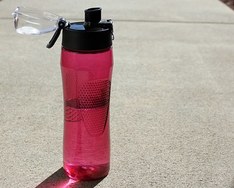|
As the New Year often brings renewed hopes and intentions for health, I recently led a class at the Verdant Community Wellness Center on Weight Management. Our topic was "Cutting Through the Hype: What Really Works for Weight Loss" based on the plethora of research on this topic. No, we haven't found the "holy grail" of macronutrient ratios yet (carbs-proteins-fats), although the internet and media is full of this kind of sound-bite-hype. What we do have is evidence from both clinical trials and real-world successful "losers" as to what behaviors work for long-term and sustainable weight loss. Check out the 2013 Obesity Guidelines for a literature review of the research and the National Weight Control Registry for real-world success stories from over 10,000 individuals whom on average have lost over 70 lbs and kept the weight off for over 5 years. Weight Management is very complex with multiple influencing factors. Some aspects that influence metabolism and weight are out of our control, such as genetics, gender and age. However, there are many healthy habits that we can cultivate, which are associated with long-term success in meeting and maintaining a healthful weight. How are you doing with the following 12 Healthy Habits?  Sleep: Length and quality of sleep can impact regulation of stress and appetite hormones, which then impact dietary intake, blood sugar control, and weight distribution. The length of sleep associated with best weight control is between 7-9 hours, according to the Academy of Nutrition & Dietetics (AND). Plan ahead to make time for this important part of health and discuss any sleep disturbances with your physician.
 Screen Time & Sitting: NWCR data shows that successful “losers” watch less than 10 hours of TV per week. Also, if you spend a lot of time in front of a screen or sitting during your day, try to build-in small amounts of activity. Stand up, stretch, do a minute of calisthenics or take a quick walk every 20-30 minutes. This helps boost metabolism, gives your eyes a “screen break” and increases circulation.
 Portion Distortion: Typical portion sizes have increased dramatically in American cuisine. Check your plate size: it should be a maximum of 9-10 inches across. When eating out, split the meal into 2-3 portions; share with friends or box some at the beginning of the meal to take home. When reading labels, check the serving size: often times there are multiple servings in a single container.
 Hydration & Liquid Calories: Try to be proactive with hydration and in-tune with thirst vs hunger cues. Focus on water and add chunks of fruit or fresh herbs for added flavor and vitamins. Limit or eliminate the soda, juice, sports drinks, sweetened coffee drinks, and other calorie-heavy beverages for an easy decrease in calorie intake.
Stress Management: Chronically high levels of stress hormones can impact weight by increasing appetite, increasing emotional eating tendencies, and increasing insulin resistance. Find non-food-related ways to “decompress” throughout the day and after work (i.e. walking, deep breathing, meditation, etc.). Exercise is one of the best stress busters!  Support System: Surround yourself with positive people, deflate your saboteurs (including your own self-sabotaging thoughts/behaviors), have a few exercise buddies, and take advantage of online and technological motivators (tracking and education tools). Frequent check-ins with a trained professional have been shown to result in greater weight loss, according to the 2013 Guidelines for the Management of Overweight and Obesity in Adults.
 Goal Setting: Set both short-term and long-term goals. Make these SMART: Specific, Measurable, Achievable, Relevant, and with a Time frame. Making goals SMART increases the likelihood of success, which then leads to increased motivation toward your next SMART goal. For example, "I want to lose weight" might be a healthful outcome, but it is not a very "SMART" goal. Instead, focus your short-term goals on the behaviors that will get you to your desired outcomes. An example of a SMART goal could be: "I will attend my favorite exercise class this Friday morning." It is very specific, achievable in my schedule, relevant to my big-picture goal of fitness, and has a specific time-frame associated with it. These Healthy Habits for Weight Control are not glamorous quick-fixes. They are unlikely to lead to rapid weight loss....thankfully, as we know that a healthful rate of weight loss is between 1/2 - 2 lbs per week, per the National Institutes of Health guidelines. What they can do for you is provide multiple avenues to address this complex endeavor in ways that are sustainable and can become integrated into your overall lifestyle. Be positive, be persistent and get the support you need to reach your goals!
Good Luck and Cheers to a Healthy 2017! ~ Megan, MS, RDN, CDE
16 Comments
10/14/2018 12:05:22 am
Wow !!! Your Blog tips are really appreciable i really like these. Fitness is the more important thing in our busy lifestyle. If you need a happy life then you need a healthy and active body.
Reply
9/9/2020 12:01:21 am
Hormones play a key role in weight management. Not only do they stimulate metabolism but they also affect fat storage. Insulin, estrogen, cortisol, leptin, DHEA, testosterone, and thyroid-related hormones are the main hormones responsible for weight gain.
Reply
1/26/2021 01:21:29 pm
I didn't know that Americans typically eat only half the amount of fiber that they need. I am trying to improve my weight this year so I can run a marathon. I'll try to eat more fiber and I will look for a weight management clinic I can go to.
Reply
4/17/2021 04:52:20 am
Hi Author,
Reply
7/27/2021 07:24:36 am
I've been having a hard time losing weight, and I'm not sure what to do about it. It makes sense that I would want to get a professional to help me out with this. They would be able to help me get some good health habits.
Reply
2/7/2023 05:26:40 am
I was captured when you discussed that it takes a while for us to acknowledge fullness. My friend wants to manage her weight. I should advise her to look for a specialist in weight management to ensure healthful food items.
Reply
4/16/2023 09:27:03 am
This article provides 12 healthy habits for sustainable weight management, backed by research and real-world success stories. It emphasizes the importance of factors such as sleep, activity, portion control, mindful eating, hydration, and stress management. The article encourages setting SMART goals and finding a supportive environment to maintain healthy habits. These practical tips can help individuals achieve and maintain a healthy weight in the long run.
Reply
4/17/2023 08:08:41 pm
I appreciate you mentioning that fiber promotes satiety (fullness) and feeds your probiotics, which are good bacteria (which have been shown to be correlated with weight control). My sister wants to lose weight. I'll advise her to visit a specialist who specializes in weight loss to ensure that her diet is healthy.
Reply
5/4/2023 05:12:36 am
I love that you talked about the healthy habits that you should develop for managing your weight properly. This is essential for most people that are on the overweight and obese side as this can help them reduce their weight and be healthy again. The other day, my friend has been struggling to lose weight, he was on a strict diet and has not seen results even after 2-3 weeks of exercising. He was asking me if I knew any ways to properly manage his weight. Thanks to this article, I will surely let him know about the healthy habits that will help him reduce weight and ask him to consult a well-known weight loss center if he continues to not see results.
Reply
Ajbhar
5/27/2023 05:45:53 am
Your expertise is evident in every word of this well-crafted post. Thank you for sharing your knowledge. <a href="https://www.digistore24.com/redir/283755/Ajbhar150/" target="_blank">click here</a> for additional information.
Reply
Roshan Kumar
5/27/2023 08:49:30 pm
I'm impressed by the depth of your knowledge on the topic. Your post demonstrates a thorough understanding and expertise. <a href="https://17bcdtlyssfvgu00ufsfm3-l9u.hop.clickbank.net" target="_blank">click here</a> for more insights and details.
Reply
kati
5/29/2023 06:02:35 am
Your post provided a fresh perspective on this topic. <a href="https://bit.ly/43diQrK" target="_blank">click here</a> for additional information.
Reply
vijay
5/31/2023 10:49:09 am
I'm impressed by the depth of your knowledge on the topic. Your post demonstrates a thorough understanding. <a href="https://earning-empires.blogspot.com" target="_blank">click here</a> for additional insights and details.
Reply
Premananda pradhan
6/2/2023 12:53:45 am
Thank you for sharing this insightful and well-written blog post. The clarity of your writing made it easy for me to understand the concepts, and I appreciated the actionable advice you provided. To explore more, <a href="https://oyeneed.blogspot.com/?m=1" target="_blank">click here</a>.
Reply
Leave a Reply. |
SD BlogA place for our consultant Registered Dietitian Nutritionists (RDNs) to share nutrition science, yummy and healthy recipes, tips on seasonal ingredients, and other nutritional musings. Enjoy! Categories
All
Archives
May 2024
|







 RSS Feed
RSS Feed